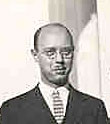Little is known about most female pioneers in psychology, and Else Frenkel-Brunswik is no exception. Although her contributions to the field of psychology were exceptional, she has been left out of the mostly male history of the field. The goal of this paper is to correct that problem and to give Else Frenkel-Brunswik the recognition for her achievement.
Else Frenkel was born in Lemberg, a small Polish town that was part of the Austro-Hungarian Empire, on August 18, 1908. She was the second of three daughters of Abraham and Helene Frankel, and her father was a prominent Jewish banker. Her family was forced to flee to Vienna in 1914 do to a pogrom that year in which Jews were randomly attacked. In Vienna, her and her family flourished. Her father became a bank director, and eventually owned his own private bank. She began her own psychoanalysis in Vienna, and through this analysis she came up with her "Cordelia Complex." Frenkel-Brunswik often claimed that her intellectual achievements were a direct result of her older sister Cordelia's beauty, hence the name of her "complex."
It was in Vienna that Frenkel-Brunswik began her education. She graduated from the gymnasium in 1926, and immediately started college at the University of Vienna. She received her doctorate of psychology there in 1930. In 1930, she became an employee at the psychological institute at the University of Vienna, and she led the department of biographical psychology. It was here that she began to work with Karl and Charlotte Buhler in biographical psychology. Karl and Charlotte led the Psychological Institute during the time that Frenkel-Brunswik was there.
In 1938 she was forced to flee Vienna because of the Anschuss that incorporated Austria into Nazi Germany. She moved to New York, where her future husband, Egon Brunswik, was already at. Egon was also an immigrant to the United States. He was born in Budapest in 1903. Egon was also a psychologist, having received his Ph.D. from the University of Vienna in 1937. It was here that Frenkel-Brunswik and Egon first met. Egon came from a Hungarian background of minor nobility. Edward Tolman, a psychologist known for his blend of Gestalt psychology and behaviorism, spent a year in Vienna, where he met and became friends with Egon. In 1935, Egon received a Rockefeller fellowship, which enabled him to visit Berkeley, where Tolman worked. He stayed on at Berkeley and became an assistant professor of psychology in 1937.
Egon Brunswik

Egon and Else were married in New York on June 9, 1938, much to the surprise of her practicing Jewish family. Her father, who she was very close to growing up, forgave her and maintained contact with her. Once they were married, they went to Berkley so Egon could take a teaching position there. Due to nepotism rules at the college, Frenkel-Brunswik was not permitted to pursue a tenure track in psychology at the school. Instead, in 1939, she became an associate researcher at Berkley's Institute on Child Welfare. She stayed in this position until 1958. In 1944, she was also allowed to become a lecturer at Berkeley, which gave her the chance to teach seminars in the psychology department, where she had a very devoted student following. In 1953, Frenkel-Brunswik became an associate researcher at Berkeley's Institute of Industrial Relation.
Frenkel-Brunswik and Egon's relationship was not without its problems. Although very devoted to each other, they never had children. After a long and painful bought of severe hypertension, Egon committed suicide. This absolutely devastated Frenkel-Brunswik. It was during this time that Frenkel-Brunswik began to receive recognition for her work. Frenkel-Brunswik soon followed Egon's example and overdosed on barbiturates on March, 31, 1958.
Major Contributions
Frenkel-Brunswik's life was full of trials and tribulations. The fact that she felt inadequate when compared to her sisters was only the beginning. She was forced from her home not once but twice because of her religious background. When she reached the United States, she encountered anti-feminism in the nepotism laws. She was also not given credit in a lot of her findings because she was female. Despite all of these obstacles, she was still able to make profound leaps in the field of psychology.
Her first publication came soon after arriving in the United States. Written in Vienna and majorly influenced by psychoanalysis, "Mechanisms of Self-Deception," became the first paper to bring the theories of psychoanalysis into everyday life. She began to publish articles in prominent psychological journals, focusing mostly on personality and motivation. It was during this time that there came a big push fro the psychological world to try and figure out exactly how World War Two came about. More specifically, the push was to figure out how the Nazi's could have committed such horrible atrocities. Frenkel-Brunswik joined forces with Nevitt Stanford and Daniel Levinson to design and launch studies of anti-Semitism. In 1945, the American Jewish Committee supported the expansion on these studies, and Theodor Adorno joined in their research. Their research was published in 1950 in the book The Authoritarian Personality.

Their book became the first study to find a link between childrearing, character structure and personality. They characterized the authoritarian personality syndrome as a weak and dependent person who sacrifices their identity of the self in order to maintain a precarious sense of safety and order. Most people with this syndrome grow up in very strict households where the rules are followed to the letter and there are very strict punishments for any rule breaking. These people grow up and internalize these very strict moral beliefs, and that strict obedience to these moral codes leaves them feeling very insecure when they can not live up to the high standards that they have set for themselves. In their worlds, strength and power are seen as good traits and everything else is a sign of weakness. There is a direct correlation between having this syndrome and having a strong prejudice against out-groups. These people view their own in-group as being strong, powerful and good, so therefore all other groups must be weak and wrong. Besides her central role in the conception of the study, Frenkel-Brunswik contributed to the book the systematic analysis of the clinical interviews that distinguished between highly prejudiced and unprejudiced persons. This study and the book that came out of it led to the development of the F-scale (F is for fascist). This scale is still used today to help determine whether or not someone has an authoritarian personality.
In addition to her work on The Authoritarian Personality, she also did research on prejudice in children, and wrote on intolerance on ambiguity as a cognitive style of personality that emerged in her studies of prejudice. It was about the time that Frenkel-Brunswik was beginning to receive recognition for her work that her husband, Egan, took his own life. After his death, she received a Fulbright Fellowship at the University of Olso, but even the year she spent there did not bring her out of her depression. Now that the nepotism barrier was removed, her colleagues pushed for her to obtain full professorship at Berkeley, in recognition of her many contributions to the field of psychology. Her appointment was endorsed unanimously by the full professors on December 4, 1957. Unfortunately, for Frenkel-Brunswik it came too late. Although she appreciated her colleagues support, she was still bitter about many things, her husband death and the fact her being female had hindered her career. Frenkel-Brunswik took her own life in her fiftieth year.
Frenkel-Brunswik's contributions to the field of psychology did not die with her, although the recognition that she should of gotten seems to have been buried. Theodor Adorno is the one that gets credit for the findings on the authoritarian personality, even though without Frenkel-Brunswik's contributions the book would of probably never have gotten published. The Authoritarian Personality was the first book to really look at how the atrocities of World War Two could happen. Her research opened the door for other social scientists to begin to look for meaning in the horrible actions the Nazi's took towards the Jews. Because of her work, and the work of many others like her, we can find warning signs that can help us prevent these horrendous acts from happening again. She did many studies on authoritarian personalities, in children as well as adults. She also did studies on psychological factors in politics, motivation and behavior, mechanisms of self deception, psychoanalysis in science, and many others throughout her distinguished career. Else Frenkel-Brunswik was a pioneer in the field of psychology, especially in personality and psychoanalysis research. She was a person that was loved by everyone around her; friends, colleagues and family alike. She certainly deserves not only a place in our history books, but a place in our hearts and minds as well.



